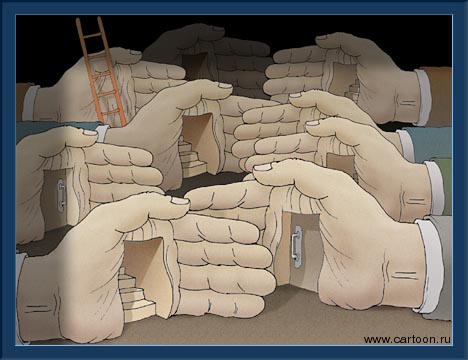Russian officials will be required to pay fees from bribes
 Researching phenomenon of corruption in Russia is under scrutiny of the Anti-Corruption Presidential Council: it is going to examine the work of “weak points” of the state apparatus and establish control over the officials’ spending.
Researching phenomenon of corruption in Russia is under scrutiny of the Anti-Corruption Presidential Council: it is going to examine the work of “weak points” of the state apparatus and establish control over the officials’ spending.
Meanwhile, experts believe this is not enough for eradicating bribery.
Ministry for Economic Development has prepared the anti-corruption program in the beginning of November, upon the President’s request. The Ministry introduced about 100 long-term and short-term measures aimed at eradicating bribery and recommended to establish the collective decision based institution for fighting corruption, and appoint officials and representatives of civil society in this institution. However, the President limited this initiative to establishing in the end of November advisory Anti-Corruption Council and two commissions inside it. The Commission headed by Deputy Head for President Administration Dmitry Kozak is designated to deal with settling conflicts between officials, and the commission headed by Deputy Prime Minister Boris Aleshin is required to fight corruption.
It took the Council three months to set the directions for its work. According to the source in the government apparatus, the Commission headed by Aleshin intends to analyze the functions of the state apparatus in theory (on the level of legislation) and in reality, after this the Commission will develop special anti-corruption bills. The source says the commission headed by Kozak will conduct similar analysis of work of law-enforcement and court institutions. The staff and work procedure for the Anti-Corruption Council will be set by the beginning of March.

The latest rating of Transparency International NGO (researching estimation of corruption by specialists of different spheres) gave Russia 86th position out of 133. According to INDEM Foundation estimate, Russians give bribes for the sum more than $30 billion every year (about 10 percent of GDP).
Transparency International surveys demonstrate that 62.3 percent of Russians consider the corruption within the political system as “very strong”, at the same time people are irritated most of all with the corruption in political parties and law-enforcement bodies (24.5 and 17,9 percent respectively). Then follows Health Care (15.3 percent), courts (10.9 percent), educational institutions (8.8 percent). Utility services are the last on the list - (8.3 percent).
The source in the government apparatus reminds that almost all the functions of the executive power bodies have already been analyzed on the level of legislation by the Commission on Administrative Reform. The Anti-Corruption Commission intends to engage in its work businessmen for some well-known Russian business community organizations to comprehend how executing functions of authorities contradicts the law.
"Without businessmen’s advise it is impossible to analyze corruption, we know better the real situation about corruption", says President of OPORa Rossii (Support for Russia) organization for small business Sergey Borisov. After detecting cases of violating the law the corruption-fighters are going to introduce control over the revenues and property of officials and members of their families. They will have to prove that their spending is equal to their official income.
"In addition, we will have to elaborate the bill on lobbying activity and give a definition of civilized lobbyism”, says the source in the Anti-Corruption Commission. The Commission promises to introduce prosecution for “non-civilized” lobbying, including criminal prosecution.
Source in Russian Finance Ministry agrees that only legislative measures are not enough to solve the problem of corruption. "Certainly, legislative measures undermine corruption. However, to solve this problem we need strong political will and different relation of the society to the problem of corruption”, says the official of the Ministry.
Experts and businessmen believe that the proposed measures are not enough to eradicate corruption. Public must be informed of all detected cases of corruption, and punishment for bribe-taking must be unavoidable, Chairman of Committee on Constitutional Legislation Vladimir Pligin believes.
According to Head of the Commission on Administrative Reform of Russian Union of Manufacturers and Businessmen Alexander Shokhin and Provost of School of Economics Yaroslav Kuzminov “earnings of state officials should be raised”. Mr. Kuzminov added, “We should create high risk for corrupted officials and also deprive officials of many power functions”.
"We undergo regular “personnel cleaning”, but this does not change the real situation”, says the official lobbying big industrial holding. “If the law on lobbying is passed, the authorities actions will become predictable, and the efforts on lobbying will be conducted in accordance with legislation”.
Vice President of INDEM Foundation Mikhail Krasnov doubts if the commission will achieve any results after refining the legislation.
"Corruption will be on a big scale until normal political competition is not introduced in Russia”, says Krasnov. “In Great Britain, Germany and the USA corruption was reduced to the narrow niche only because certain political party bears the responsibility for the conduct of every official”.
Source: Novosti Gumanitarnyh Technologi
Subscribe to Pravda.Ru Telegram channel, Facebook, RSS!


